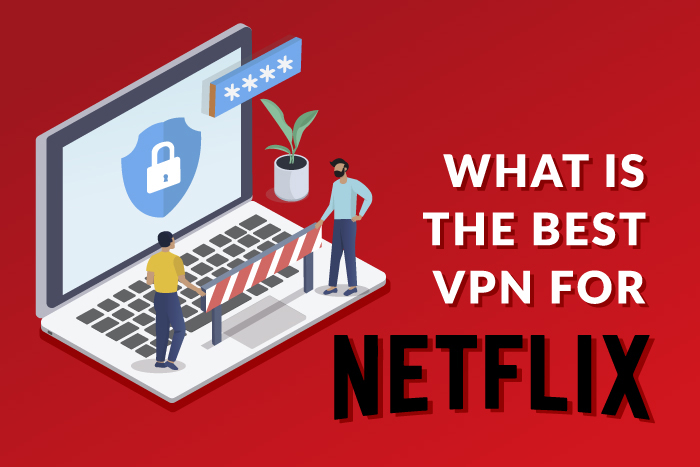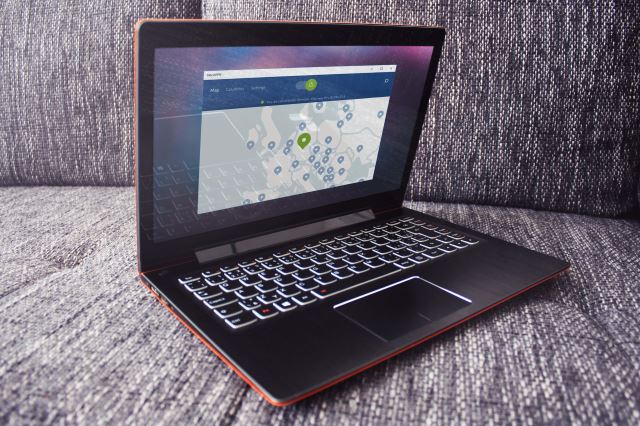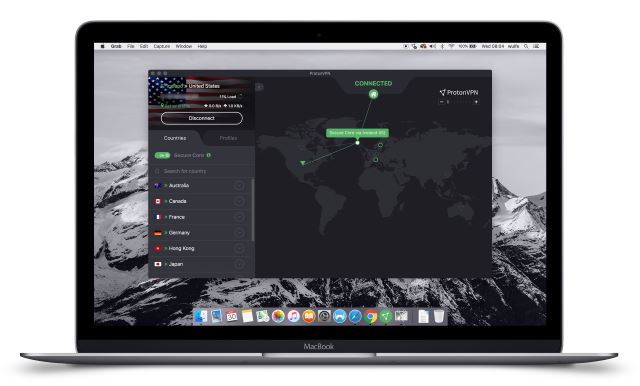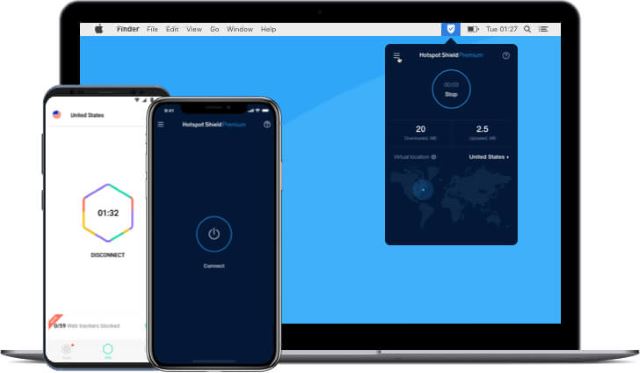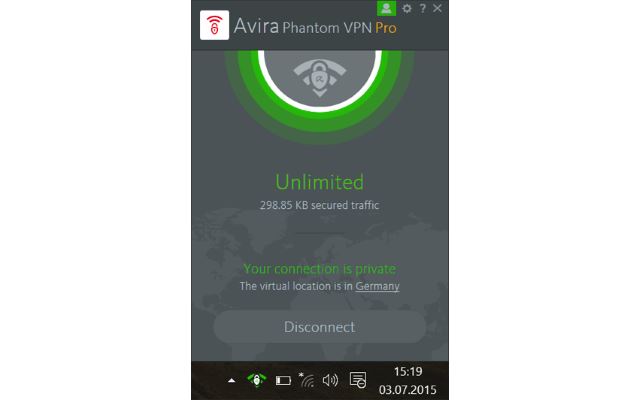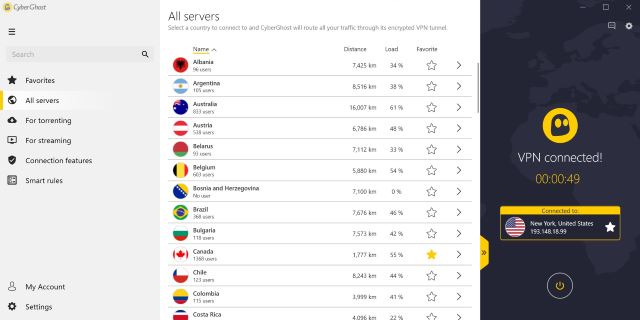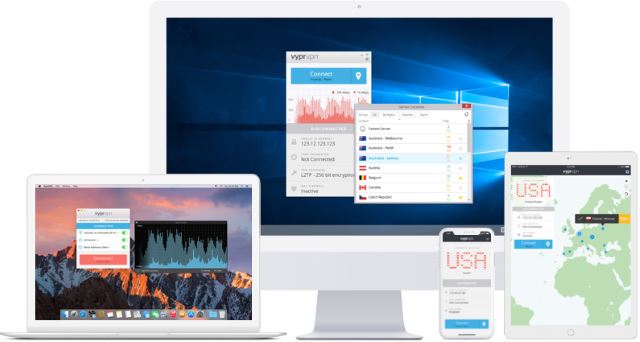What is the Best VPN for Netflix? (2020 Comparison Guide)
If you’re like most Netflix subscribers, you probably connected your account to your home internet long ago – and then never put much thought into that connection again. But there’s actually another, often superior way to watch Netflix using what’s called a Virtual Private Network (VPN).
Maybe you’ve heard of a VPN but don’t really know what it is, or maybe you’re not sure how it affects your Netflix viewing experience. Our complete guide to the Best VPN for Netflix has everything you need to know including:
- What is a VPN?
- How Do I Find the Best VPN?
- How Can a VPN Enhance My Netflix Viewing Experience?
Don’t worry if you’re not familiar with any of this, or aren’t very tech-savvy in general. We’ll keep it simple, easy and jargon-free. Ready to find a whole new world of TV shows and movies? Let’s get started!
In this article you will find out...
- A Quick Overview
- How Does Netflix Decide What You Can Watch?
- Does Netflix Want You to Use a VPN?
- How Does Netflix Know Where You Are?
- What is a Virtual Private Network?
- What are the Benefits of a VPN?
- How to Select the Best VPN for Netflix
- What are the Downsides of Using a VPN?
- Popular VPN Companies to Consider:
- Setting Up and Using Your Virtual Private Network
- Final Thoughts
A Quick Overview
A Virtual Private Network disguises your location on the internet. Why does that matter to Netflix? Because available content varies based on the subscriber’s geographic location. By disguising your location, you’re basically tricking Netflix into letting you access a surprisingly large number of shows which would otherwise be off-limits.
Let’s take a closer look at what’s going on:
How Does Netflix Decide What You Can Watch?
Netflix doesn’t provide a uniform viewing experience for every subscriber. Instead, the content available depends on where you live. The concept is called “region locking” or “geolocking.” Different countries are divided into separate regions (and sometimes different regions are even found within the same country).
Game of Thrones is one of the more famous recent examples of a show region locked by Netflix. For a short period, the popular drama was available on Netflix – but only in Australia. If you’re in the U.S., hearing that GoT was available on Netflix at all is probably surprising. After all, the show is rather famously made by HBO.
Which brings us to the why behind region locking: licensing. The licensing deals Netflix brokers with content producers varies by, you guessed it, geographic location. For example, in the U.S., HBO has no particular reason for licensing their most popular show to another content provider. Doing so would encourage people to subscribe to Netflix instead of HBO. But a licensing deal made sense in Australia where HBO subscription rates are different.
Each content provider has different, unique motivations behind licensing. Content creators with their own viewing platform typically have no financial motivations for licensing their shows on Netflix. Examples here include HBO, CBS All Access and other large networks.
However, the situation changes across other countries. For example, the CBS network only exists in America. They don’t have the infrastructure to deliver their content to other countries – but Netflix does. It makes financial sense for them to license their shows to Netflix for foreign use to reach an audience they otherwise couldn’t. (We’re just using CBS here as a general example of any major American TV network.)
Does Netflix Want You to Use a VPN?
In short, no. But, truthfully, there’s not much they can do about it, either.
Geolocking is motivated mainly by money. Content producers want to squeeze every last buck out of the content they create (and that’s certainly their right to do so). If a company benefits financially by licensing their content to Netflix, they’ll license. If not, they won’t.
When consumers watch content outside of their region, content producers lose money. So, perhaps not surprisingly, Netflix is against customers accessing content outside of their region. Section 4.3 of their terms of service agreement addresses the issue:
You may view Netflix content primarily within the country in which you have established your account and only in geographic locations where we offer our service and have licensed such content. The content that may be available to watch will vary by geographic location and will change from time to time.
Of course, if you use a VPN to watch Netflix, the police aren’t going to break down your door and haul you to jail. In fact, because of how VPNs work, Netflix won’t even be able to identify you specifically.
Instead, Netflix can only block VPN providers. For the past few years, they’ve been cracking down on VPN providers (although they haven’t admitted to doing so publicly). At worst, the VPN you’re using simply won’t work. It’s highly, highly unlikely Netflix bans your account for using a VPN.
Blocking VPNs is a bit like playing whack-a-mole. As soon as one VPN provider is identified and banned by Netflix, two others pop up. Plus, Netflix has to perform a delicate balancing act. Research continually shows that when content is hard to find legally, consumers are far more likely to turn to piracy.
If Netflix is too effective at blocking VPNs, they run the risk of losing subscribers. If they’re too lenient, they run the risk of losing licenses from content producers.
(Note Netflix is only able to block VPNs. It doesn’t make any distinction as to how you’re using the VPN. You could have a legitimate Netflix subscription, only used to watch shows available in your region, and still end up blocked when using a VPN.)
How Does Netflix Know Where You Are?
Netflix uses your IP address to determine your location. Short for “Internet Protocol address,” your IP address is a number assigned to your computer. Every device connected to the Internet has a unique IP address.
When you want to visit a specific website, you simply type the site’s name into the browser bar to connect to the site. However, there’s much more going on behind the scenes than many people realize.
Computers talk to each using numbers. When you type a name into the URL, those letters convert to numbers which make up an IP address. It functions basically as an address. Once your computer connects to a website, they send and receive packets of data back and forth. IP addresses allow communication between computers, servers, phones, sensors and basically anything else connected to the Internet.
IP addresses aren’t handed out at random. They’re based around geographic areas. Your IP address doesn’t just identify your computer. It also identifies your exact, physical location.
The Role Your ISP Plays in Your Internet Surfing
Your Internet Service Provider (ISP) is the company which provides your internet service. For most people, that’s their cable company.
Your ISP can see everything you do on the internet. They can view the websites you visit, emails you send and all other activity. To be fair, large internet companies don’t have the time or inclination to view individual internet usage habits (well, probably), but your privacy is still basically non-existent.
What is a Virtual Private Network?
A Virtual Private Network (VPN) masks your IP address, which masks both your computer’s identity and your physical location.
VPN’s increase your privacy and security online. Plus – and most important to Netflix users – they also allow you to sidestep region locking.
Let’s unpack the name:
Virtual
The network exists only in cyberspace. That’s a good thing. You don’t need any special hardware, software or type of internet connection. If your device has a web browser, you can set up a VPN.
Private
A VPN creates an encrypted tunnel between your computer and a remote server. All web traffic routes through the tunnel. Once activated, nobody can see inside the tunnel – not the website you’re connecting to, not someone else using the same VPN, not even your ISP. Additionally, connections commonly use heavy-duty encryption.
Network
A VPN enables users to send and receive data across any shared or public network. You can go anywhere online just like normal, but you now have the additional privacy, security and even functionality of a private network.
What are the Benefits of a VPN?
VPN’s aren’t some ultra-secret hacking tool. A wide range of people use them for all sorts of reasons. Practically anyone who uses the internet even semi-regularly can benefit from regular use of a VPN. Here’s why:
Increased Security
VPN’s are the safest, most secure way to browse the internet. Without a VPN, tons of your personal information is potentially available to anyone with the skills to grab it. Your browsing history, identity, credit card info and more are at risk of exposure.
Unsecured Wi-Fi networks are the least secure. They’re typically found in restaurants, retail stores, lobbies, and other public places. Try to avoid public Wi-Fi as much as possible.
However, a VPN keeps your information private and secure. Anyone trying to trace your path online, or steal your data, will encounter the VPN server instead of yours. It’s not impervious to snooping – law enforcement and advertisers have advanced tracking tools – but it’s an excellent barrier against many truly malicious attacks.
Hidden Location
As detailed above, using a VPN to mask your IP address also changes the perceived physical location of your computer. Masking your IP address lets you get around region-locking for not just Netflix but many similar streaming services such as Hulu and others.
While side-stepping region locks to watch Netflix is a useful feature, it’s not life or death. VPN’s are also commonly used by journalists and activists operating around the world in countries with restrictive internet policies. They can be used to unblock websites, protect communications and more.
Net Neutrality Equalizer
In December 2017, Obama-era net neutrality protections were officially repealed. Now ISPs are free to regulate speeds however they wish. They can create slow and fast lanes with different pricing tiers. Although steps to restore Net Neutrality are currently on-going, consumers will be stuck with a lack of protections for the foreseeable future.
Many industry watchers fear streaming services like Netflix could be hit hard by ISP slowdowns. Consider Xfinity. Not only do they provide internet service to millions, but they also create content through their subsidiary NBC/Universal. If they slowed down Netflix but allowed subscribers fast access to NBC/Universal content, they’d be guiding subscribers away from a competitor towards their own content. (This is only a hypothetical situation at this point.)
VPNs are a potential solution for Net Neutrality problems – at least in theory. Routing your internet traffic through a VPN means your ISP can’t identify where you’re going online. Without that info, your ISP won’t be able to put you in a slow lane or black access. Again, this is all still pretty theoretical, but it could be helpful to have a VPN ready to go if necessary.
Ease During International Travel
Do you frequently travel between two countries? Netflix doesn’t always make a great travel partner. When you buy a subscription, you’re locking yourself into the region where you made the purchase.
For example, you live in America and, naturally, that’s where you were when you purchased your Netflix subscription. One day you take a trip to England. If you try to access your account, with the same login info you used at home, you can easily be hit with the warning message “Not available to watch in this country.”
Buying a second Netflix subscription just for foreign travel doesn’t feel very fair. A VPN is often a less expensive solution. Plus, by using your own Netflix account, your view history and other settings remain intact.
Ad Blocking
Many VPNs offer built-in ad blocking technology. It’s actually more important than you might think. Data usage takes on extra significance when using a VPN. You want to save your data for Netflix, not burn through it by watching ads.
A built-in ad blocker is usually better than third-party ad-blocking software. If the VPN blocks the ads on its own, then you don’t have to worry about excess data consumption.
How to Select the Best VPN for Netflix
So, you’ve decided that a VPN is how you want to watch Netflix. Now it’s time to select a VPN provider. The good news is tons of options are available.
Choose a VPN which meets your needs. Of course, you want a VPN which is ideal for watching Netflix. But you might also want to use that VPN for daily surfing or other internet activity.
Before we get into specific product recommendations, let’s first look at some general features to consider:
Price
Virtual Private Networks can be either free or paid.
Many free networks are surprisingly high-quality. Some popular free VPN providers include:
Most free services have usage limitations including limits on:
- The number of devices which can be connected simultaneously
- The amount of data used each day
- The number of private servers available
Paid VPNs lessen those limits. They typically have tiered pricing to suit different needs and budgets.
Generally, paid VPN’s cost between $6 and $12 a month. Of course, you can spend much more if you need or want to use lots of devices and transfer large amounts of data. But if you’re watching a few hours of Netflix most days, the low or mid-tier plans are probably suitable.
You’re basically doubling your Netflix bill. However, depending on where you live, you might also double your viewing library.
Never enter into a long-term contract with a VPN provider if you’re mainly using it to watch Netflix. The problem, as touched upon earlier, is that Netflix will block VPN’s from time to time. You don’t want to be stuck paying for a VPN which won’t let you watch Netflix. Even if a longer contract is less expensive upfront, you won’t save any money if you can’t use the VPN how you want to.
Speed
Netflix uses “about 1 GB of data per hour for each stream of standard definition video, and up to 3 GB per hour for each stream of HD video.” They offer four data usage settings including an Auto setting.
All VPNs will slow download speeds, some slightly and others significantly. Re-routing your data through the VPN involves more passes through servers than non-VPN usage. Generally, upload and download speeds will decrease when using a VPN. Latency – the delay which occurs before data transfers – increases, too.
Slow speeds cause stuttering audio and dropped video. Picture quality can plummet from HD to grainy low-resolution.
Security
The whole point of using a VPN is to hide your activities online. You’ll want to choose a provider committed to privacy.
Technically speaking, a VPN provider can track your activity when you’re using their network in the same way your ISP can track what you do when you’re not using a VPN.
However, VPN companies typically go to great lengths to protect your privacy. Many set up systems where your data is auto-encrypted in a way that the provider can never see or store it. After all, a VPN provider who doesn’t take customer privacy seriously won’t stay in business for long! Check the fine print before committing to any purchase.
Also, pay special attention to the claims made by the company. Be wary of promises such as “Total Anonymity” and “Total Privacy.” Facebook, Google and other services you sign into will still recognize you when you’re using a VPN. Sites can also leave cookies. Law enforcement can also monitor your VPN activities under certain circumstances (like major criminal stuff, not somebody defying region lock on a streaming service).
Finally, buy from a company based in your home country. It’s the same region as your Netflix subscription. If you ever have any problems with the service, reaching tech support in a foreign country can be difficult. A native company will have a better understanding of your country’s internet infrastructure.
Split Tunneling
Split Tunneling is a feature where you send some traffic through a VPN and others normally. It’s great if you don’t want to deal with slowdowns or data-usage management for most of your daily internet usage, like emails and whatnot, but want to run a program or two through a VPN.
For a mobile device, the VPN provider will provide a whitelist. Simply add Netflix (or Hulu, or whatever) to it. Only whitelisted items will use the VPN. You only have to add a program once, and it’ll use the VPN every time.
Setting up split tunneling on a desktop is a little trickier. You’ll have to run all VPN programs, like Netflix, in a separate, white-listed browser. The VPN can also sometimes run through a browser plugin.
Many VPN providers offer browser plug-ins including:
You can also switch web browsers. Opera includes a free VPN with split tunneling. It’s a good all-around browser, too.
Static IP
When you buy a VPN from a company, you’re assigned an IP address to use on one of their servers. However, you can also buy a static VPN. It supplies the same features and benefits as any other VPN, but on a specific IP address only used by you.
Also called a clean IP address, your permanent address won’t be associated with traditional VPN activity. You might be able to sneak past any sweeping IP bans. On the downside, if your static IP address is found and banned by Netflix, it’s basically worthless forever. TorGuard is a popular VPN which offers static IP addresses.
What are the Downsides of Using a VPN?
Speed slowdown is the biggest potential problem. Fortunately, it’s relatively rare that the slowdown will impact your ability to watch Netflix. You’ll likely only have issues if you have a slow internet connection which is already pushing the limits of what Netflix needs to run smoothly.
Another potential issue is with local traffic. Google’s Cast and Airplay are probably the two most common local streaming schemes which won’t work with a VPM. Mobile games also often have problems as well.
Finally, while not necessarily a huge problem, VPNs can cause rather weird localization effects. Google often loads up local versions based on wherever the VPN says you’re located. It shouldn’t be a major problem although you’ll want to double-check before ordering a pizza online while you’re watching Netflix!
Popular VPN Companies to Consider:
Here’s a closer look at some of the most popular VPN services for 2020. While we made sure each one works at the time of our report, Netflix and other services can potentially ban them without warning. Most VPNs have a free or trial version available, so you can try before you buy.
NordVPN
NordVPN is a great all-purpose VPN. Endorsed by PC Magazine and CNet, they have an excellent reputation for customer service and privacy protection. They’re a larger provider with over 5,200 servers worldwide.
Monthly plans run about $12. The browser app manages up to six simultaneous VPN connections, P2P connections, ad block, threat identifiers and more.
Pros:
- Over 5,200 servers available
- Company has strong pro-privacy policies
- Allows for six simultaneous connections
Cons:
- Relatively high price
- Additional connections (beyond six) not available to purchase
Proton VPN
Proton started as a tool for journalists and activists, but you don’t need such lofty goals to benefit from its many features.
Security and privacy are the two biggest draws here. Secure Core servers provide a unique defense against network-based attacks. All network traffic is protected with AES-256 encryption and other encrypted ciphers.
Proton offers three tiers of pricing plus a free version. Most Netflix users will want the Plus plan, which is $8 per month.
Pros:
- Free version packed with features
- Privacy policies you can trust
- Includes ProtonMail service
Cons:
- Fewer servers than similarly-sized VPNs
- Servers aren’t always as fast as we’d like
AnchorFree
Founders Eugene and David launched AnchorFree back in 2005. Originally focused on Wi-Fi hotspots, they quickly re-focused on creating private and secure virtual private networks. Today they offer a suite of products for mobile and PC.
Their most popular product is Hotspot Shield, a patented VPN protocol integrated by 70% of the world’s security companies. The free version has been downloaded over 650 million times. It’s one of the most popular and widely used VPNs ever.
Pros:
- Trusted line of VPN products
- Your IP address is never saved or stored
- Focus on innovated, cutting-edge security
- Easy-to-use, stylish user interface
Cons:
- No specialized servers available
- Plug-in often conflicts with Chromebooks
- Speeds can be slow
Avira Phantom VPN
For over 30 years, Avira has been committed to protecting the privacy and security of their customers online. Their Phantom VPN offers both a free and paid service.
The free service is actually fairly robust. It allows up to 500 MB of data usage each month. The paid service ups the data usage to one GB per month.
Avira never tracks your internet usage. They offer 36 server locations around the world. You should have no problem finding accessing Netflix in any country you wish.
Pros:
- The free version includes 500 MB of data
- 36 server locations around the world
- Excellent reputation for privacy or security
Cons:
- The user interface is clunky
- Servers limited to major regions
- Speeds can be slow
- No ad-blocking capabilities
CyberGhost VPN
Move invisibly through cyberspace with the CyberGhost VPN. It has flexible security features designed to mesh with practically any device. 256-bit encryption technology helps hide your online activity even on public WIFI connections.
Activity logs are never stored. It’s simply not possible for anyone to track your activity afterward. Customer privacy is a major focus here.
They offer over 3,800 VPN servers located across 60 countries. Spoof your location to access pretty much all Netflix regional content with ease. Subscribers can access seven licenses.
However, at $12.99 a month, CyberGhost is one of the more expensive options out there. While a multi-year commitment locks in significantly lower prices, a long-term contract isn’t a good idea for Netflix users.
Pros:
- Top-of-the-line security with 256-bit encryption
- Over 3,800 servers available across 60 countries
- No activity logs or other user tracking
Cons:
- High monthly cost
Golden Frog Vypr VPN
Tired of dealing with data caps? Golden Frog’s Vypr VPN offers unlimited data usage and no download caps. Get ready for some serious binge-watching.
They have over 700 servers located in over 70 countries. Even better, they own and control their servers, network, and hardware. No third-parties are involved in any way.
Plus, their support team is available around-the-clock all year long. It’s a significant difference from many VPN companies where reaching a customer rep can be quite a challenge.
Pros:
- Unlimited data usage with no data caps
- The network includes 700 servers located in 70 countries
- The helpful support team is easy to reach
Cons:
- Best monthly prices require a yearly commitment
- No ad blocking features
Setting Up and Using Your Virtual Private Network
Using one is pretty simple. Most VPN companies are tripping over themselves to make their products the easiest one to use—and customers benefit big-time.
First, you’ll install client software. Almost all VPNs work on both computers and mobile devices. Once installed, you’ll set up login information and… that’s pretty much it. Encryption and security protection is taken care of automatically.
Before you start surfing, you’ll pick a server. Most providers let you select from a globe-spanning list. For Netflix, you’ll choose a region with the content you want to watch. (You might have to do some Googling to track down regions associated with specific shows.)
Servers can also be auto-selected based on availability. That’s often a great option if you’re interested in the best connection and region doesn’t matter.
You’ll be able to see details about your VPN connection such as download speed, upload speed, and connection status. Make sure you’re completely connected to the VPN before you start surfing.
Final Thoughts
A Virtual Private Network might sound complicated, but it’s simple to use – and the benefits are worth it. You can find a whole new world of movies, music, and other content. Even better, your security and privacy online are greatly enhanced.

